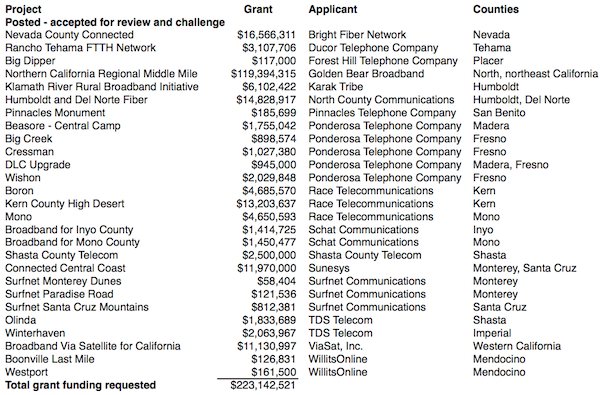
Just set me down in Kansas. They have fiber there.
Two applications submitted by Race Communications for California Advanced Services Fund (CASF) subsidies are off the table, leaving twenty-seven still under consideration. Of those, incumbent carriers have challenged twenty projects, claiming that some or all of the areas proposed for funding already receive sufficient broadband service and are ineligible.
Race originally put in five proposals for fiber-to-the-home systems in Eastern California. Mojave and California City – towns in eastern Kern County – are already wired and receiving service that meets the California Public Utilities Commission’s (CPUC) minimum 6 Mbps download and 1.5 Mbps upload standard. Race’s applications for Boron and the Tehachapi Pass area in Kern County and for four small communities in Mono County are still under consideration.
Taking Mojave and California City off the list drops the total CASF ask by $16 million to $223 million. That’s against about $158 million available to give out.
The CPUC doesn’t release details of the challenges submitted, but judging from conversations with applicants (including my own clients) and others, wireline and fixed wireless broadband providers are defending their turf against new competitors. Challenges from Comcast, Charter, SuddenLink, Verizon and others have been directed at competitive last mile and middle projects that encroach on their territory.
It seems likely that the seven proposals that weren’t challenged were submitted by small rural telephone companies that are the incumbents in their areas.
The largest projects have caught the most flak. By far, Golden Bear Broadband is asking for the most money and ViaSat is claiming the biggest chunk of California. Those two have also attracted the most protests.
It’s also the job of CPUC staff to independently compare eligibility claims made by applicants with service information filed by incumbents, including mobile carriers. The end result could be extensive (and possibly expensive) field testing by applicants to puncture inflated service claims by the likes of Verizon.

Once all the ineligible projects have been tossed, the remaining ones will be ranked and the available money given out accordingly. Expect the review and decision process to take several more months.
